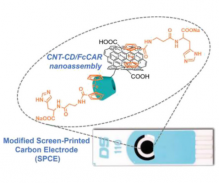Screen-Printed Carbon Electrodes with Cationic Cyclodextrin Carbon Nanotubes and Ferrocenyl-Carnosine for Electrochemical Sensing of Hg(II)
Chiara Abate and Alex Fragoso in collaboration with Giulia Neri, Angela Scala, Placido Giuseppe Mineo, Enza Fazio, Antonino Mazzaglia, Ottavia Giuffrè Claudia Foti and Anna Piperno published the following article:
ACS Appl. Nano Mater. 2023
Abstract
The study reports the use of nanoassembly based on cationic cyclodextrin carbon nanotubes (CNT-CDs) and ferrocenylcarnosine (FcCAR) for electrochemical sensing of Hg(II) in aqueous solution. β-cyclodextrins (CDs) were grafted onto CNTs by a click chemistry reaction between heptakis-(6-azido-6-deoxy)-β-cyclodextrin and alkyne-terminated CNTs. The cationic amine groups on the CD units were produced by the subsequent reduction of the residual nitrogen groups. The chemical composition and morphology of CNT-CDs were analyzed by X-ray photoelectron spectroscopy, scanning electron microscopy, and thermogravimetric analysis. A N,N-dimethylformamide dispersion of CNT-CDs was cast on the surface of screen-printed carbon electrodes (SPCEs), and the electrochemical response was evaluated by cyclic voltammetry (CV) using [Fe(CN)6]3- as the redox probe. The ability of SPCE/CNT-CD to significantly enhance the electroactive properties of the redox probe was combined with a suitable recognition element (FcCAR) for Hg(II). The electrochemical response of the CNT-CD/FcCAR nanoassembly was evaluated by CV and electrochemical impedance spectroscopy. The analytical performance of the Hg(II) sensor was evaluated by differential pulsed voltammetry and chronoamperometry. The oxidative peak current showed a linear concentration dependence in the range of 1-100 nM, with a sensitivity of 0.12 μA/nM, a limit of detection of 0.50 nM, and a limit of quantification of 1 nM.

